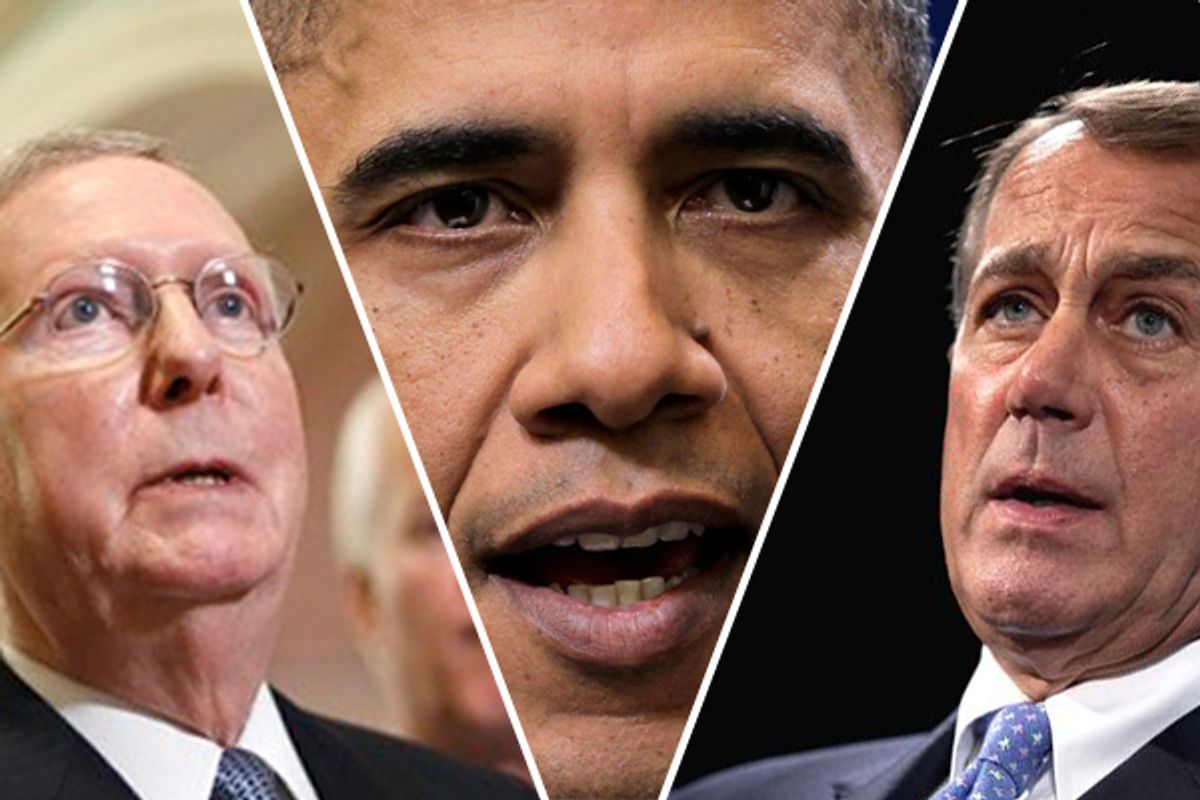It seems logical to conclude that President Obama's sudden eagerness to pick fights with Republicans means that he's realized the folly of his "reasonable man" strategy and junked it. But a better way to understand the president's new confrontational posture is as an extension of that strategy.
The "reasonable" approach, remember, grew out of the GOP's midterm landslide last fall, with a chastened Obama seeking to win back voters by showing a desire to compromise with Republicans on Capitol Hill. If Republicans reciprocated, the thinking went, Obama would benefit from a surprisingly productive legislative year. And if they rebuffed him, he'd also benefit, since it would expose the GOP as a band of obstructionists bent on advancing a narrow agenda and scoring political points.
The strategy was most prominently on display this summer, when Obama made an elaborate show of offering Republicans a "grand bargain" on deficit reduction that included steep cuts to Medicare and Social Security. Democrats were livid, but Republicans -- after stringing Obama along for weeks -- still wouldn't go along, with Speaker John Boehner walking away from the talks just days before the debt ceiling deadline.
According to its design, this should have been a triumphant moment for the "reasonable man" approach. And in a way, it was: When the debt ceiling crisis was finally resolved, polls showed that Americans were much angrier with Republicans over it than they were with Obama. One survey found that just 33 percent of voters viewed the Republican Party favorably -- the worst score ever recorded for either major party.
But it was far from a complete triumph, because the widespread anger at the GOP failed to translate into newfound support for Obama, whose overall job approval rating (and standing in head-to-head match-ups with potential 2012 foes) has continued to deteriorate since the debt ceiling fight. In other words, he succeeded in making his opponents look very unreasonable, but didn't get any points for coming across as reasonable himself.
In a way, though, the debt ceiling experience is a perfect setup for what Obama is now doing. Take his new threat to veto any deficit reduction plan that the congressional supercommittee produces if it doesn't include more tax revenue from wealthy Americans. No longer is Obama instinctively staking out a compromise-friendly position. How this will be regarded by the public is a fascinating and tricky question. On the one hand, polls consistently show that voters strongly agree with the principles Obama is now articulating. On the other hand, public opinion is quirky. As Greg Sargent put it today:
Now, Republicans tend to think such polling isn’t that meaningful. Even if it shows public support for high-end tax cuts, Republicans are happy to target Democrats on the issue, because they can continue to make the general charge that Dems are tax-hikers, furthering the narrative of profligate Big Government liberals running off the spending rails. Republicans believe this narrative is very potent with moderates and independents. And there very well may be something to this.
When you factor in the the number of pundits and media outlets proclaiming that Obama is playing to his base and ignoring moderates with his new approach, the danger for the president here becomes obvious.
How can he combat it? Here the damage that he helped inflict on the GOP 's image this summer could be very helpful. If his Republican opponents are seen as fundamentally unreasonable ideologues, Obama may have more leeway than he otherwise would to behave "unreasonably" -- especially if he is doing it in the name of a principle with which most Americans say they agree. Now when Republicans (or the press) bemoan Obama's supposed unwillingness to reach across the aisle and compromise, he can reply, "I already tried that, over and over and over" -- and there's a chance voters will know what he means.
Of course, there's also a chance they won't, but that's the risk that comes with being president when the economy is as rotten as this.



Shares